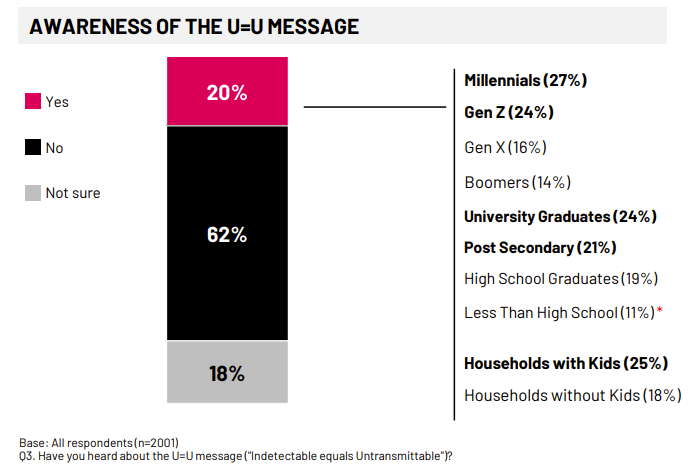Majority of Canadians Unaware of Life-Saving U=U Message, New Report Finds
Majority of Canadians Unaware of Life-Saving U=U Message, New Report Finds
A startling national report from the Canadian Positive People Network reveals that a majority of Canadians are unaware of one of the most important messages in the fight against HIV stigma: Undetectable = Untransmittable (U=U).
According to the newly released Ipsos report, just 20% of Canadians say they’ve even heard of U=U—a message backed by extensive scientific research showing that people living with HIV who are on effective treatment and have an undetectable viral load cannot transmit HIV to sexual partners.
Among those who had heard of U=U, fewer than half were familiar with the science that supports it, the report found.
Developed in partnership with REACH Nexus at St. Michael’s Hospital (Unity Health Toronto) and Ipsos, and funded by REACH, Gilead Sciences, and the Public Health Agency of Canada, the report provides a national snapshot of current awareness and understanding of U=U across the country.
“This message changes lives,” said a member of CPPN's U=U Task Force. “When people understand that treatment can make HIV untransmittable, it removes the fear and shame that so often isolate those living with HIV.”
The report’s release also coincides with Zero HIV Stigma Day, a call to action to dismantle stigma and discrimination, amplify truth, and celebrate the leadership of people living with HIV.
U=U is one of the central messages of this important global, community-led public health campaign. Understanding its message doesn’t just fight HIV stigma—it transforms lives.

People living with HIV who know that Undetectable = Untransmittable are more likely to report better mental, physical, and sexual health. This breakthrough science has redefined what it means to live—and love—with HIV.
Simply knowing about U=U can eliminate stigma and discrimination, help prevent new cases, and improve quality of life for people living with HIV.
One key finding of the report: once explained, the U=U message resonates.
More than half of Canadians find U=U believable, and the strongest predictor of belief is prior awareness. In other words, the more people know, the more they believe—and that has a tangible effect on reducing stigma.
66% of respondents say that increasing awareness of U=U could influence public attitudes and help dismantle long-standing discrimination against people living with HIV.
Education emerges as a critical tool in the fight against stigma.
An overwhelming majority—91%—say it’s important to include the U=U message in secondary school sexual education programs, with six in ten rating it “extremely” or “very” important.
“These numbers show both the promise and the challenge of U=U,” the U=U Task Force member added.
“It has the power to transform public understanding—but only if people actually hear about it, believe it, and understand the science behind it.”
The report also found that nearly 9 in 10 Canadians (86%) say they’ve heard of HIV, and just over a quarter (27%) report having been tested for it. Yet when asked how HIV is actually transmitted, the results were troubling. Only 23% of respondents correctly identified all three accurate transmission routes—unprotected sex, sharing needles, and from mother to child during childbirth or breastfeeding—without selecting any incorrect options.
“This is a major red flag,” said the U=U Task Force member. “Misinformation breeds stigma, and stigma remains one of the biggest barriers to ending the HIV epidemic in Canada.”
Still, the findings underscore how much work remains.
While one in three Canadians say learning about U=U makes them more comfortable interacting with or dating someone living with HIV, the majority remain unconvinced or uncertain. In fact, 34% say it wouldn’t change their comfort level, 11% say they’d feel less comfortable, and 17% are unsure.
The report highlights that ongoing education, improved messaging, and greater visibility of U=U are essential to shifting public attitudes.
As Canada faces rising HIV rates in several provinces, the urgency is clear: knowledge isn’t just power—it’s prevention.

REACH Nexus is committed to advancing U=U efforts across Canada. We are currently working to implement U=U University, created by the Prevention Access Campaign, to expand U=U awareness and reduce HIV stigma. We also plan to host a Canadian Train-the-Trainer event to build community capacity to share accurate U=U information.
Wider understanding of U=U is still needed, and REACH Nexus is proud to help lead this work by empowering people living with HIV, educating communities, and supporting a future free of HIV stigma.
“We’ve made incredible scientific progress,” said the U=U Task Force member. “Now it’s time for public health leaders, policymakers, and governments to step up with bold, effective communication that meets the moment.”










